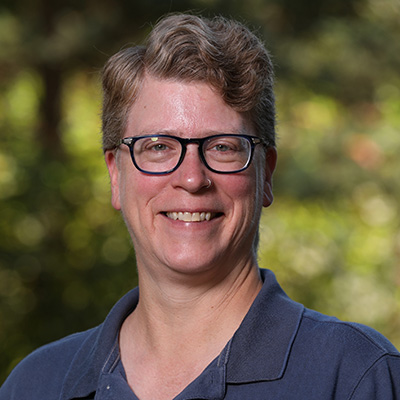
Heather N. Pool
I teach courses in Western canonical political theory (POSC 180 Introduction to Political Thought; POSC 284 Doing Political Science: American Political Thought; POSC 381 Ancient Political Thought; POSC 382 Modern Political Thought; POSC 383 Contemporary Political Thought). These courses offer students the opportunity to read through centuries or millennia of political thought in the course of a single term; we read primary texts from the great thinkers in the Western tradition, such as Plato, Aristotle, Hobbes, Locke, Marx, Arendt, Paine, Du Bois, etc. Each student who majors or minors in political science must take one political theory course, and all PPE majors must take two. While the texts are often formidable, my goal is to have students learn to ask big questions about political priorities and purposes and to formulate their own reasoned responses to those questions. In addition, I teach topics courses that align with my research interests in political theory, American political development, race and racial formation, law, and mourning. I’ve recently taught three topics courses in this vein: Freedom and Responsibility; Race and Law; and the Politics of Memory, Trauma, and Mourning.
My book project on political mourning asks two main questions. First, why are the deaths of some people politically significant? That is, why do some deaths (like those of Trayvon Martin or Mike Brown) reach a wide audience and lead to political activism while other deaths, often in very similar circumstances do not? Second, how do political identity and conceptions of responsibility shape who is mourned, but also transform the boundaries of belonging and obligation? That is, to be politically mournable, one must typically be considered a part of the dominant group; as a result, the political community is understood to have an obligation to prevent certain types of harm from coming to group members. But moments of mourning demonstrate that these boundaries and contours are plastic; they shift, and can expand or contract, depending on how political agents frame tragic deaths.
Learning & Teaching
Advising Circle
Introduction to Political Theory (POSC 180)
Doing Political Science: American Political Thought (POSC 284)
Ancient Political Theory (POSC 381)
Modern Political Theory (POSC 382)
Contemporary Political Thought (POSC 383 – coming soon!)
Topics Course: Freedom and Responsibility (POSC 389)
Topics Course: Race and Law (POSC 389)
Senior Seminar: The Politics of Memory, Trauma, and Mourning (POSC 491)
Research
Using the resources of critical and normative political theory, sociolegal scholarship, race and gender scholarship, and American political development, my research focuses on how ideas, identities, and events shape political institutions.
My dissertation, completed in 2011, focused on moments when the deaths of everyday citizens led to some kind of political change. An article taken from my dissertation appeared in Polity in 2012 as “The Politics of Mourning: The Triangle Fire and the Consolidation of Political Identity.” In that article, I examine the Triangle Fire of 1911 as an example of how mourning the loss of everyday citizens can become an effective means of calling for political change, with a particular focus on how the racial identities of the victims shaped the conversation. Another article, drawn from my dissertation, is forthcoming in 2014 in Law, Culture and the Humanities; “Mourning Emmett Till” considers the role of Emmett Till’s 1955 murder in the new interest of Northern whites in civil rights struggles in the South. I am in the process of revising my dissertation into a monograph, which will be submitted to publishers by summer 2017.
Additionally, my co-author Allison Rank and I have a pedagogy piece in PS: Political Science & Politics titled “Writing Better Writing Assignments.” Allison and I have another piece under review on pop culture and politics, under review since June 2016.
I have another piece on the 2015 Charleston Massacre that explores the conflict between state sovereignty and white supremacy in the response of the state of South Carolina (and the nation as a whole) to a white extremist’s deadly attack on a black prayer meeting. This piece will be under review by the summer of 2017.
Over the next few years, I plan to work on two pedagogy pieces. The first will lay out a process instructors can use to help students learn how to do deeper analysis. The second will compare student learning using quizzes v. student learning using reading posts. Both of these will be in process by Fall 2017; and hopefully out for review the summer of 2018. Finally, after I complete my current book, I aim to begin work on another looking at the political phenomenon of mourning white loss; I envision this book as a step beyond my current book project that focuses on how whites in America have responded to and are responding to the erosion of white privilege.
Works
Book
Heather Pool, Political Mourning: Identity and Responsibility in the Wake of Tragedy (Philadelphia: Temple University Press, 2021).
Journal Articles
Heather Pool and Allison Rank, “Exposing the War on Women: The Limits of Law and Power of Care to Address Sexual Violence in Contemporary Crime Drama,” New Political Science 41:1 (March 2019), 36-54. https://doi.org/10.1080/07393148.2018.1558036
Heather Pool, “Mourning Emmett Till,” Law, Culture, and the Humanities 11:3 (October 2015), 414-444. https://doi.org/10.1177/1743872112440235
Allison Rank and Heather Pool, “Writing Better Writing Assignments,” PS: Political Science and Politics 47:3 (July 2014), 675-681. https://doi.org/10.1017/S1049096514000821
Heather Pool, “The Politics of Mourning: The Triangle Fire and Political Belonging,” Polity 44:2 (April 2012), 182-211. https://doi.org/10.1057/pol.2011.23
Chapters in Edited Volumes
Allison Rank and Heather Pool, “Building Worlds: Three Paths Toward Racial Justice in Black Panther,” in The Politics of the Marvel Cinematic Universe, edited by Nick Carnes and Lilly Goren (Lawrence: University of Kansas Press, forthcoming).
Heather Pool, “Removing the Confederate Flag in South Carolina in the Wake of Charleston: Sovereignty, Symbolism, and White Domination in a ‘Colorblind’ State,” in Democratic Arts of Mourning: Political Theory and Loss, David McIvor and Alexander Hirsch, eds. (Lanham, MD: Rowman & Littlefield, 2019), 41-64.
Book Reviews
Heather Pool, Review of American Mourning: Tragedy, Democracy, Resilience, Simon Stow (Cambridge: Cambridge University Press, 2017), Political Theory 47:3 (2019), 429-434. https://doi.org/10.1177/0090591718786711.
Heather Pool, “The Power of ‘We’: The Dialectics of Identities and Institutions,” Review of How Americans Make Race: Stories, Institutions, Spaces, Clarissa Rile Hayward (New York: Cambridge University Press, 2014), Journal of Political Power, 8:1(2015), 145-152. https://doi.org/10.1080/2158379X.2015.1010804
Service
- Association for Political Theory
- American Political Science Association
- Western Political Science Association




